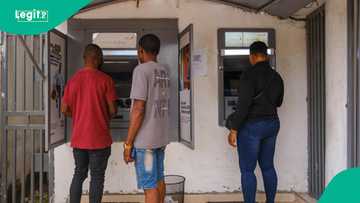Tariff Hikes: Bank Customers Choose New Alternative, Abandon SMS Alerts
- Bank customers are opting out of SMS alerts for emails following the increase in alert charges
- Nigerian banks increased SMS alert charges by 50% from N4 to N6 per message, stating that the move was due to tariff hikes
- However, experts have said the move by customers to deactivate SMS alerts can be counterproductive, as it may delay actions on suspicious transactions
Legit.ng’s Pascal Oparada has reported on tech, energy, stocks, investment and the economy for over a decade.
Bank customers nationwide have disclosed that they will opt for email alerts from their banks to reduce charges on their accounts.
The customers disclosed recently that they would deactivate SMS transaction alerts linked to their accounts.

Source: UGC
Banks give customers alternatives to SMS alerts
Several aggrieved customers claimed that the move was prompted by the increase in SMS charges by banks, who in turn attributed the development to rising tariffs by telecom companies.

Read also
Disco explains reasons customers may not get refunds for investment in transformers, cables, others
Legit.ng reported that Guaranty Trust Bank informed its customers that SMS alerts to their phones would be increased by 50%, from N4 to N6 per SMS.
Like others, the bank attributed the increase to the hike in tariffs by telecommunication companies.
GTBank, however, told its customers that they can opt out of SMS alerts anytime by visiting the bank’s website.
Expert discloses demerits of SMS alert deactivation
However, Janet Ogochukwu, a senior banker and economist, said deactivating SMS alerts has its demerits, stating that customers are alerted in real-time about transactions on their accounts via SMS.
“SMS alerts are almost real-time, allowing customers time to act in case of unauthorised debits or transactions on their accounts.
While email alerts are free, they depend on internet availability in some locations. This can delay any actions customers want to take,” she said.
Banks, telcos to end SMS charges
Meanwhile, another report by Legit.ng said that banks and telcos are planning to start charging customers from their airtime, rather than from deposits.
Telecommunication subscribers will soon be charged for using Unstructured Supplementary Service Data (USSD) through deductions from their airtime.
Reports say talks have advanced between commercial banks and the telcos to introduce an end-user billing system.
Customers to be charged for airtime for USSD
The move is a departure from the former corporate billing system, where bank customers were charged for USSD from their deposits.
The chairman of the Association of Licensed Telecom Operators of Nigeria (ALTON), Gbenga Adebayo, disclosed that the discussions are ongoing and that the modalities are being put in place to incorporate subscribers, telcos and the banks in one suit.
The Guardian reports that the ALTON boss said the end-user billing system, which the banks have been promoting, might help against accumulated USSD debts, curtailing the impasse between the banks and the telecom operators.
Banks to end USSD charges on deposits
Adebayo said that the parties have commenced discussion to migrate to an end-user billing system without disruptions to services for subscribers.
According to him, the conversation has begun, and there will be a migration process that the parties will agree to, marking the end solution to the issue of USSD debts, which he said the banks have been advocating for.

Source: Getty Images
A September 16, 201,9, memo to ALTON from the Body of Banks’ Chief Executive Officers (BOBCEO) proposed an orderly implementation of end-user billing for bank customers, aligning it with standard practices for USSD billing.
Banks settle N160bn SMS debt
Legit.ng previously reported that as commercial banks and other financial institutions introduced new SMS alert fees, the long-standing impasse over Unstructured Supplementary Service Data (USSD) debt between banks and telecommunication companies has been resolved.
MTN Nigeria’s chief executive officer, Karl Toriola, confirmed the development during an interview on Arise Television as he spoke on the Q1 financial results of the firm.
The USSD debt had been a major issue between the two critical sectors in Nigeria’s economy, lasting over five years.
Proofreading by James Ojo, copy editor at Legit.ng.
Source: Legit.ng




